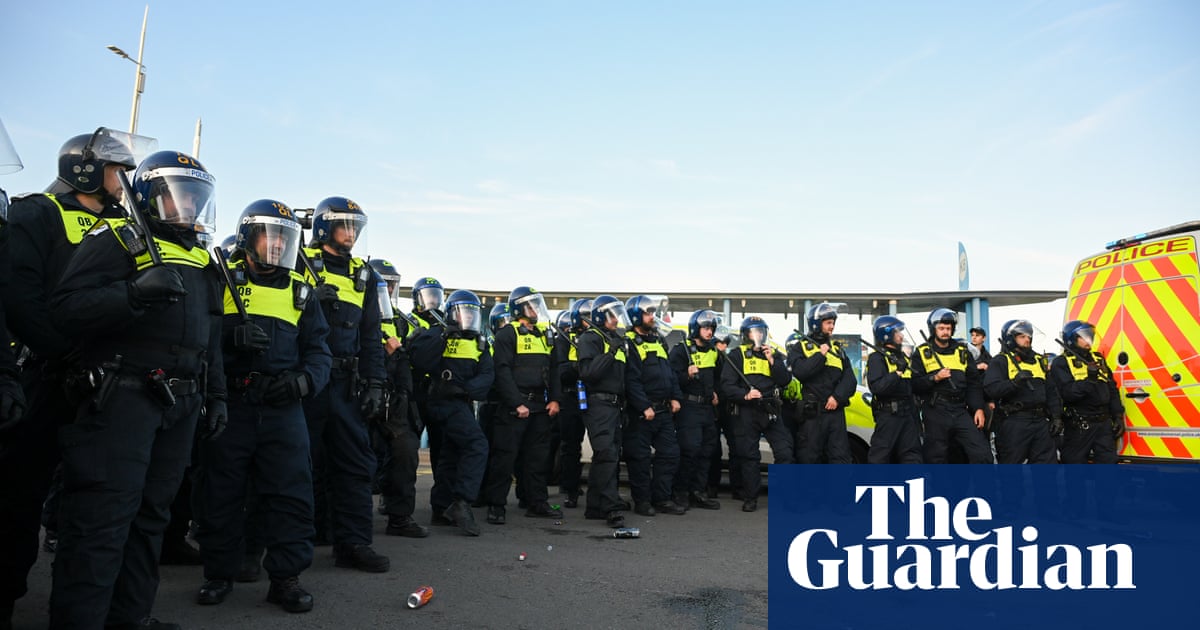
King Charles has sent his “heartfelt thanks” to the police for restoring order after speaking to Keir Starmer and senior officers following the week of unrest across the UK.
The king and the prime minister held a phone call on Friday evening, Buckingham Palace said. Gavin Stephens, a chief constable and chair of the National Police Chiefs’ Council, and the UK gold commander Ben Harrington, chief constable of Essex police, held a separate joint call with the king.
A palace spokesperson said: “In these calls, His Majesty was updated on the current situation and expressed his heartfelt thanks to the police and emergency services for all they are doing to restore peace in those areas that have been affected by violent disorder.”
The king is said to have “shared how he had been greatly encouraged by the many examples of community spirit that had countered the aggression and criminality from a few with the compassion and resilience of the many”.
Starmer earlier said that online misinformation laws will be reviewed after a spreading of falsehoods contributed to the far-right riots.
The prime minister said social media was “not a law-free zone” during a visit to a police station on Friday, hours before two men were jailed for encouraging people on social media to attack hotels housing asylum seekers.
He was asked about the warning by the London mayor, Sadiq Khan, that the Online Safety Act was not fit for purpose and needed to be revisited.
Starmer told broadcasters: “I do agree that we’re going to have to look more broadly at social media after this disorder, but the focus at the moment has to be on dealing with the disorder and making sure that our communities are safe and secure.”
There have been calls for the Online Safety Act, which empowers the media regulator, Ofcom, to fine social media platforms that fail to tackle disinformation, to be enforced more quickly.
YouGov polling published on Friday suggested that 66% of people thought social media companies should be held responsible for posts inciting criminal behaviour, and 70% believed they were not regulated strongly enough.
Of those polled by YouGov this week, 71% said they thought social media companies did a bad job tackling misinformation during the riots.
Talking about social media, Starmer said: “The first thing I’d say is, this is not a law-free zone. And I think that’s clear from the prosecutions and sentencing. Today we’re due sentencing for online behaviour.
“That’s a reminder to everyone that whether you’re directly involved or whether you’re remotely involved, you’re culpable, and you will be put before the courts if you’ve broken the law.”
He added that social media executives should be “mindful of the first priority, which is to ensure that our communities are safe and secure”.
On Friday, Jordan Parlour was jailed for 20 months at Leeds crown court for publishing Facebook posts encouraging people to attack a hotel housing more than 200 asylum seekers and refugees in the city. It was the first case of its kind relating to recent disorder in England and Northern Ireland.
Tyler Kay, 26, was jailed for 38 months at Northampton crown court after stirring up racial hatred by using social media to call for hotels housing asylum seekers to be set alight.
after newsletter promotion
Ministers are hopeful that the prosecutions will deter further rioting, but they have vowed to look at social media regulation more broadly in the coming months.
Khan said on Thursday: “I think very swiftly the government has realised there needs to be amendments to the Online Safety Act. I think what the government should do very quickly is check if it is fit for purpose. I think it’s not fit for purpose.”
Nick Thomas-Symonds, the paymaster general, told BBC Radio 4’s Today programme the government was prepared to “quickly review and consider” the act, and that police would “come after people” found to be inciting violence online.
“Sadiq Khan’s challenge is that we quickly review it, consider it, and that’s exactly what we will do … That’s a very legitimate policy challenge; it’s important to get that right,” Thomas-Symonds said.
“But irrespective of that policy debate, people who are acting now doing illegal things online like inciting violence, encouraging violence, organising violence, that is against the law now – and if you are doing that now, just as if you are engaging in threats or violent disorders on our streets, the police will come after you.”
The Online Safety Act became law last October and gives Ofcom the power to fine social media companies up to £18m or 10% of their global turnover if they fail to take robust action against illegal content inciting violence or terrorism.
Ofcom is still drafting guidelines on how it will implement the law on illegal content, with enforcement not expected to begin until next year.
The biggest platforms could face billions of pounds in fines if they do not comply. Named managers could be held criminally liable in some instances, and sites may face having their access limited in the most severe cases.
More than 200 campaign groups in the UK and Ireland signed a joint letter urging Westminster, Belfast and Dublin to work together to hold social media companies to account over misinformation.
The campaign groups, which included 38 Degrees and Hope Not Hate, called on the UK and Irish governments to establish a joint public inquiry to “investigate how these companies have been allowed to operate with impunity and shine a light on the harms they have caused”.
Source: theguardian.com


















